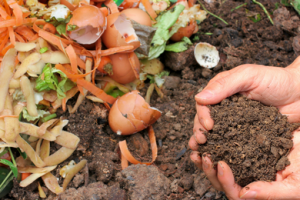Sustainable Development Goal 12 focuses on production and consumption patterns, aiming to promote sustainability in both. Sustainable production and consumption of everything needed for human life is strongly correlated with the health of animals, plants, and the environment since it covers most of the human behaviors that endanger and degrade them.

For example, Target 12.2 aims to achieve “the sustainable management and efficient use of natural resources”. Depending on the type of natural resource, achieving this target could have major implications. Responsible consumption of fossil fuels can help combat climate change thus protecting the “health” of the planet. Reducing food waste can save forests and other natural environments, since expanding agricultural land is one of the main causes of deforestation. This, in turn, protects wild animals by protecting natural habitats and halting biodiversity loss.
Efficient use of water protects lakes and rivers and the animals and plants that live there. Finally, sustainable land use, especially when building new houses and developments, can protect whole ecosystems as well as reducing habitat loss for many species. All these positive outcomes for animal and environmental health have positive health effects on humans as well. Human encroachment is an important driver of spillover events that spread new or previously localized infectious diseases. Unsustainable use of freshwater sources affects the availability of water for human activities, from agriculture to drinking water, and increases the risk of floods and droughts. Similarly, poorly regulated construction and development can increase vulnerability to natural disasters. All of the above are amplified by climate change which has been shown to supercharge certain natural disasters, increase the unpredictability of precipitation both in time and quantity, as well as promoting the diffusion of many infectious diseases in new geographical areas due to increases in temperatures.

An area of intervention that has a direct impact also on human health is the proper management of chemicals and other wastes. Industrial wastes, especially when containing dangerous chemicals, severely affect the health of humans, animals, plants, and the environment.
Even though their effect is worse in the proximity of the factories or plants producing them, this is a worldwide issue. Multiple chemical wastes end up in water sources and therefore the oceans, or in the soil, where they are absorbed by crops often traded and consumed over long distances if not globally. A particular case is the production of antibiotics. In the bodies of water near plants that produce antibiotics or their ingredients, there are often extremely high levels of “super-bugs”, microbes resistant to antimicrobials, that pose a serious risk for people around the world.
Sustainable Development Goal 12 suggests three levels of action: private companies, local and national governments, and individuals. For the latter, this goal explicitly stresses the importance of promoting education and awareness among everyone in the world since everybody can do their part. Indeed, this is one of the few goals where individual actions can make a big difference if enough people participate. In particular, the goal, for everyone, should be to reduce consumption whenever possible. Then, trying to acquire things that can be reused (the more times, the better). Finally, to recycle everything that needs to be discarded. In synthesis: reduce, reuse, recycle.
By: Dr. Luca Mantegazza | Research Program Coordinator
 0
0
